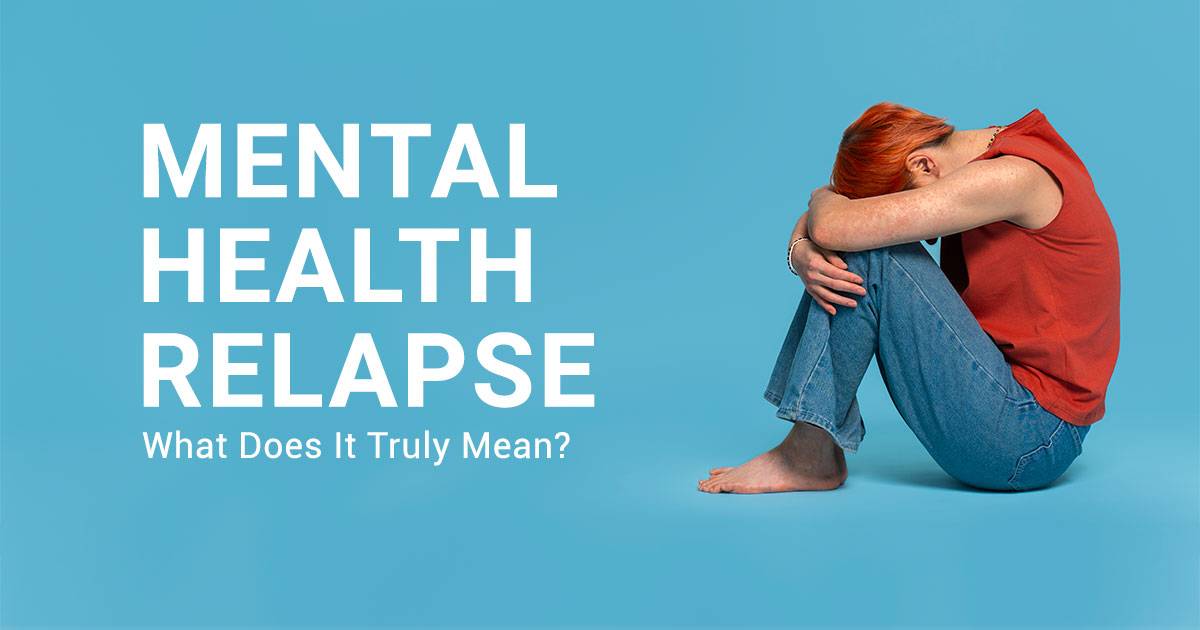Mental Health Relapse: What Does It Truly Mean?

The National Institute of Mental Health reports that about one in five U.S. adults, or nearly 57.8 million people, have a mental health condition. While treatments such as therapy and medication can effectively reduce or eliminate symptoms, there is no cure for mental illness, making mental health relapses a common experience.
Understanding What Mental Health Relapse Means
The definition of relapse in mental health is that the progress someone has made in managing their condition is interrupted, and their symptoms return. This can look different for each person with a different mental health issue. For instance, someone with depression might start feeling sad and hopeless again, while someone with anxiety might feel excessively worried or have panic attacks again.
Examples of Mental Health Relapse and How They Feel
When someone’s mental health gets worse after improving, it’s called a relapse. Here are some examples of how this can happen:
- Depression: Someone who was feeling better from depression might start feeling sad and uninterested in things again. They may also have changes in how much they eat or sleep.
- Anxiety Disorders: For someone with anxiety, a relapse could mean feeling very worried or having panic attacks again. They might feel restless, have trouble focusing, or have physical symptoms like sweating or a fast heartbeat.
- Bipolar Disorder: In bipolar disorder, a relapse might mean going back to feeling overly energetic or very down. During a high-energy phase (manic episode), they might feel happy or irritable. In a low-energy phase (depressive episode), they might feel sad and hopeless.
- Schizophrenia: For someone with schizophrenia, a relapse might mean hearing voices or believing things that aren’t true (hallucinations or delusions). They could also change how they think, feel, and act.
- Substance Use Disorders: A return to substance use disorders means that a person starts using drugs or alcohol again after having stopped. This can happen because of stress, pressure from others, or reminders of their past substance use.
How People Experience Mental Health Relapse
During a mental health relapse, people may notice their symptoms returning gradually or suddenly. They might feel overwhelmed, frustrated, or scared. Some common experiences during a relapse include:
- Finding it harder to do daily tasks.
- Feeling more irritable, sad, or anxious.
- Physical symptoms include changes in appetite, sleep problems, or tiredness.
- Getting farther away from other people and avoiding social settings.
- Having trouble focusing or choosing what to do.
- Using unhealthy ways to cope, like using drugs or avoiding problems
If someone feels like their mental health is relapsing, it’s important to get help from healthcare professionals, friends, and family. Getting help early and following the right treatment can help manage symptoms and prevent more relapses.
Factors That Can Lead to Mental Health Relapse
Several things can contribute to a relapse in mental health, such as:
- Stopping Treatment: If someone stops taking their medication or goes to therapy too soon, it can increase the chances of a relapse.
- Stressful Events: Major life changes, like losing a job or a loved one, can trigger a relapse.
- Lack of Support: It can be hard to deal with things when you don’t get enough help from family, friends, or medical professionals.
- Using Substances: Misusing alcohol or drugs can make symptoms worse and raise the risk of a relapse.
- Neglecting Self-Care: Not taking care of oneself, like not sleeping enough or eating well, can affect mental well-being.
Tips for Preventing and Managing Mental Health Relapse
Although relapse in mental health can be discouraging, there are ways to prevent and manage it:
- Stick to Your Plan: Follow your treatment plan, which may include medication, therapy, and lifestyle changes.
- Get Support: Get close to people who understand what you’re going through and can help and support you.
- Learn Ways to Cope: Learn how to deal with stress and your feelings well.
- Keep an Eye on Your Mental Health: Watch for signs of your symptoms returning and seek help early.
- Take Care of Yourself: Do things that help you unwind and feel good first.
Understand & Manage Mental Health Relapse
Mental health relapse is a normal part of many people’s journeys. You should be kind and understanding when you talk about it. By staying informed, sticking to your treatment plan, and seeking support when needed, you can navigate through relapses and work towards feeling better again.
